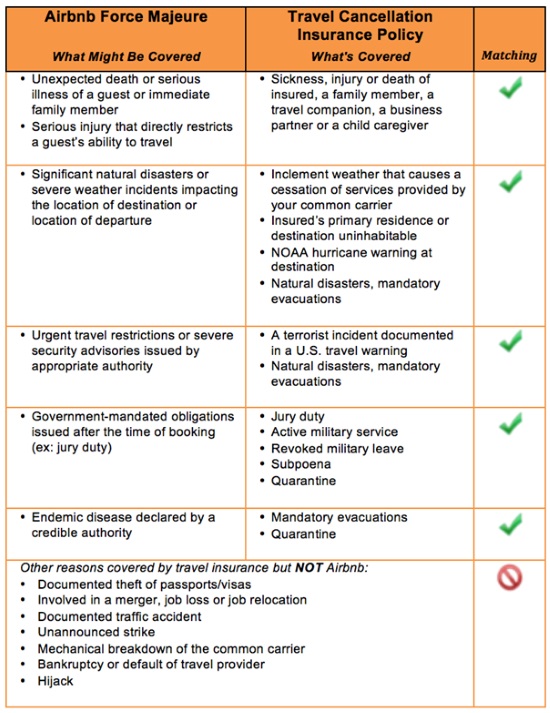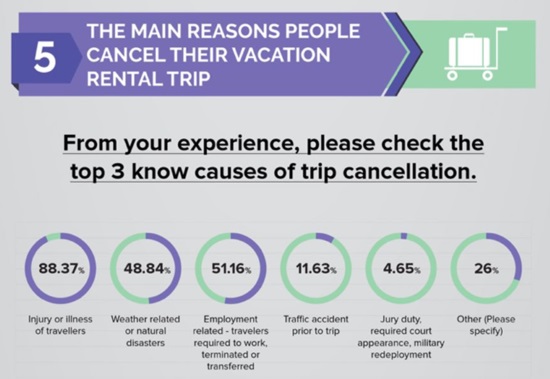Airbnb, its hosts and the complex world of Insurer Of Last Resort
Unlike researching and booking an exotic trip, you receive neither the aspirational effect nor a dopamine rush when you research and purchase a travel insurance policy. In short: nobody buys travel insurance because it’s fun!
When you purchase travel insurance, you’re essentially transferring your underlying travel risk for a fee. In the vacation rental market, particularly for owners and property managers of seasonal properties, the underlying risk for travel cancellations can take on a more visceral form (i.e. a threat to livelihood) if the property manager is left holding the baby, so to speak.
Sometimes you just have to cancel
On a recent trip to Barcelona. I met with a vacation rental property manager who we’ll call Miguel. Miguel had rented out a luxury beachside villa for two weeks during the peak summer season to a British guest who made the reservation through Airbnb. Days before the guest’s stay, she informed Miguel that she could not travel due to an illness in the family. Miguel informed the guest that per the super strict cancellation conditions, no refund was due and that there was not enough time to fill the reservation. The guest cited that she had medical evidence that the cancellation was legitimate, but unfortunately Miguel was still not able to refund the guest. The guest took the matter directly to Airbnb and, unbeknownst to Miguel, Airbnb enforced the force majeure clause (i.e. valid extenuating circumstance) in their terms and conditions, resulting in the guest receiving a refund and Miguel dealing with the hefty bill. Unfortunately for Miguel he became what we’ve termed “The Insurer of Last Resort”…
Sherlock by name, Sherlock by nature
After hearing Miguel’s story, I decided to do some of my own investigating and … his story checks out. The Airbnb terms and conditions (i.e. a reason that allows a guest to avoid cancellation fees) are intriguingly similar to the coverage of a travel insurance policy.
See the below table which compares what Airbnb says could allow a guest to avoid cancellation fees and what a travel insurance policy covers.

We surveyed 500 vacation rental property managers and asked about the top three reasons their guests cancel, and unsurprisingly the top reason they gave matched the top loophole in Airbnb’s Force Majeure terms. Our other findings revealed that employment related cancellations and weather or natural disaster related cancellations were also a very popular reason guests cancelled their trips.

Don’t get me wrong – I’m not an Airbnb opponent
I am probably one of the biggest users of Airbnb with 41 stays in ten countries, and 30 glowing reviews by hosts. So, speaking from experience, if I cancel and don’t have travel insurance, I would not expect the host to be “The Insurer of Last Resort”. That’s just not fair to hosts and I think Airbnb should move to address this for the sake of all concerned. In our earlier example, if the client had taken out travel insurance, both the host and the guest could have transferred the risk to the insurance company, and both would be able to keep their money. Instead, the Airbnb Force Majeure terms transfer all of the risk to the hosts, even though they expressly had “super strict cancellation conditions”. Go figure!
Who’s looking after the “little guys”?
In my mind, hearing Miguel’s story validates our approach to look after “the little guys” in the vacation rental market when it comes to travel insurance.
So that hosts can avoid the hassles we’ve had in the past of dealing with insurance companies, we created a simple process that enables hosts to offer their guests a travel cancellation option.
Therefore, if the guest declines the insurance, cancels their reservation and doesn’t want to honor the cancellation conditions, the host has a stronger case to make to credit card companies and Airbnb to avoid the chargebacks.
On the positive side, if the guest buys coverage and needs to cancel their reservation, then everyone wins!
I believe Airbnb is a fair-minded company, and I’ve seen Brian Chesky reach out on Twitter asking the community for ideas on how to improve their service. This is a little longer than 140 characters, but alas my contribution to try and identify a potentially serious issue which viscerally affects the livelihood of Airbnb hosts who appear to have inadvertently become “The Insurers of Last Resort”.


